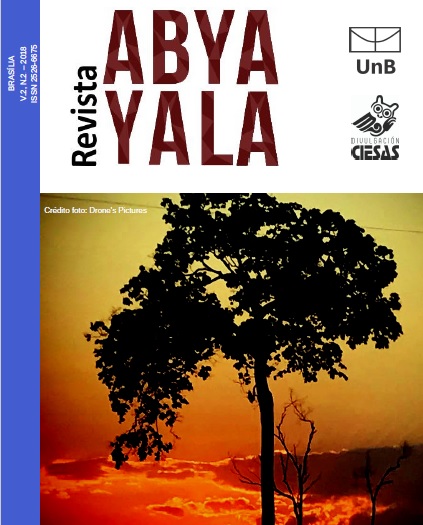“RISING THE ANCIENT RHYTHMS”
Memoria y política mapuches en contextos de violencia
DOI:
https://doi.org/10.26512/abyayala.v2i2.13068Abstract
Abstract: This article is based on two ethnographies, produced in the Argentinean Patagonia, in which the ancestral advice to “rise the ancient rhythms” is a collective matter. Having settled these narratives, this article explains the complex relations between ancestry, territory and leadership as well as the potential of memory projects in the restoration of affective bonds and the refoundation of the political forms of “togetherness” after contexts of massive state violence. In these ideological, epistemic and ontological terms of memory, is possible to understand the political projects of Mapuche peoples as well as how to bring into question the presumptions about modern world´s political theories.
Key words: memory, violence, politics, Mapuche, leadership
Downloads
References
BAUMAN, Richard y Charles BRIGGS.1990. “Poetics and Performance as critical perspectives on lenguage and social life”. Annual Review of Antrophology, 19. Pp. 59-88.
BRIONES, Claudia. 2017. “Spirituality we do not have such a Thing: Patrimonialization Processes as Minefields”. Journal of Historical Archaeology & Anthropological Sciences. J His Arch & Anthropol Sci 2(2): 00045. DOI: 10.15406/jhaas.2017.02.00045.
BENJAMÍN, Walter. 1991. El Narrador. Madrid: Taurus.
BUTLER, Judith. 2002. Cuerpos que importan. Sobre los límites materiales y discursivos del “sexo”. Buenos Aires: Paidos
CALVEIRO, Pilar. 2006. “La memoria como future”. Actuel Marx/ Intervenciones 6:61-76.
CAÑUMIL, Pablo y Ana RAMOS. 2011. "Knowledge Transmission through the Renü". Collaborative Anthropologies 4: 67-89.
CARSTEN, Janet. 2007. “Introduction: Ghosts of Memory”. En Carsten, Janet (ed,) Ghosts of Memory. Essays on Remembrance and Relatedness. Australia: Blackwell. Pp. 1-35.
CONNERTON, Paul. 2008. “Seven types of forgetting”. Memory Studies 1(1): 59-71.
DAS, Veena. 1995. Critical events: An anthropological perspective on contemporary India. Delhi, India: Oxford University Press.
DELRIO, Walter. 2005. Memorias de expropiación. Sometimiento e incorporación indígena en la Patagonia (1872-1943). Bernal: Universidad Nacional de Quilmes.
GEERTZ, Clifford. 1990. La interpretación de las culturas. Barcelona: Gedisa.
GOLLUSCIO, Lucía y Ana RAMOS. “El ‘hablar bien’ mapuche en zona de contacto: valor, función poética e interacción social”. Signo y Seña 17: 93-114.
MASSEY, Doreen. 2005. For Space. London: Sage Publications.
MCCOLE, John. 1993. Walter Benjamin and the Antinomies of Tradition. Ithaca and London: Cornell University Press.
O’NEILL, Kevin y Alexander HINTON (eds.) 2009. Genocide, Truth, Memory, and Representation. Durham and London: Duke University Press.
RICHES, David 1986 (ed.). The Phenomenon of Violence. In The Anthropology of Violence. Oxford: Blackwell.
RAMOS, Ana. 2010. Los pliegues del linaje. Memorias y políticas mapuches-tehuelches en contextos de desplazamiento. Buenos Aires: Eudeba.
RAMOS, Ana. 2017. “Cuando la memoria es un proyecto de restauración: el potencial relacional y oposicional de conectar experiencias”. En BELLO, Álvaro et. Al. (eds.) Historias y memorias. Diálogos desde una perspectiva interdisciplinaria. Temuco: Ediciones Universidad de la Frontera, pp. 32-50.
RAMOS, Ana y Lorena CAÑUQUEO. 2018. “ ‘Para que el winka sepa que este territorio lo llamamos de otra forma’: producción de memorias y experiencias de territorio entre los mapuche de Norpatagonia”. Revista RUNA. Archivo para las Ciencias del Hombre 39 (1).
RAMOS, Ana y Walter DELRIO. 2005. “Trayectorias de oposición. Los mapuches y tehuelches frente a la hegemonía en Chubut”. Briones, C. (comp.) Cartografías argentinas: políticas indígenas y formaciones provinciales de alteridad, Buenos Aires: Antropofagia, pp. 79-118.
ROSEBERRY, William. 1994. Hegemony and the Language of Contention. En J. Gilbert y D. Nugent (comp.), Everyday Forms of State Formation. Revolution and the Negotiation of Rule in Modern Mexico (pp. 355-366). Durham y Londres: Duke University.
STELLA, Valentina. 2018. Subjetividades mapuche-tehuelche: un análisis situado en el mapa hegemónico de la localidad de Puerto Madryn (Chubut), Tesis de Doctorado, Universidad de Buenos Aires.
STEWART, Pamela y Andrew STRATHERN. 2002. Violence: Theory and Ethnography. New York: Continuum.
TAUSSIG, Michael. 1984. “Culture of Terror, Space of Death. Roger Casement’s Putumayo Report and the Explanation of Torture.” Comparative Studies in Society and History 26(3): 467-497.
Downloads
Published
How to Cite
Issue
Section
License
Copyright (c) 2018 Abya-Yala: Journal on Access to Justice and Rights in the Americas

This work is licensed under a Creative Commons Attribution-NonCommercial 4.0 International License.
The sending of contributions to Abya Yala implies the assignment of copyright and publication to the Journal, observing the Attribution-Non-Commercial 4.0 International (CC BY-NC 4.0) adopted.
The content of the texts submitted to and published by the journal will be the sole responsibility of their respective authors.
Copyright: https://creativecommons.org/licenses/by-nc/4.0/deed.en





